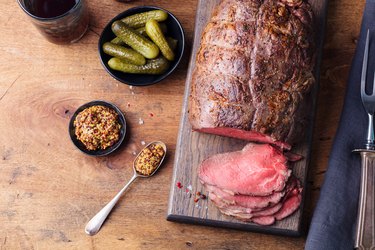
Whether you're preparing a lavish Sunday feast or weeknight meal, flavorful dutch oven roast beef isn't as painstaking as you might think. In fact, you can have the roast and a side of roasted vegetables on the table in less than 90 minutes.
Dutch Oven Roast Beef Meat
Video of the Day
To make the best Dutch oven roast beef, you need to have the best ingredients. While even cheap cuts of beef can turn out tender and tasty when slow-roasted, high-quality cuts of meat will garner even better results.
Video of the Day
Buy your meat from a trusted source — a quality supermarket, local butcher, farmer's market or reputable mail order supplier. Choose beef that is humanely raised and expertly handled after slaughtering for the most tender and best tasting beef.
The topic of hormones in beef and their effect on human health is controversial, and as yet there is no conclusive evidence to support either side of the argument, according to Winchester Hospital. However, many health-conscious people still want to keep hormone-treated foods off their tables. The easiest way to do that is to buy certified organic meat, which cannot be given antibiotics or hormones.
Something that has been proven to negatively affect your health is saturated fat. Red meat is one of the richest sources of saturated fat, too much of which can increase your levels of bad, low-density lipoprotein cholesterol and raise your risk of heart disease and stroke, according to the American Heart Association.
Leaner cuts of meat are lower in saturated fat and better for your health. To be labeled lean, a 3-ounce serving must have less than 10 grams of total fat, 4.5 grams of saturated fat and 95 milligrams of cholesterol.
According to Mayo Clinic, the leanest cuts of meat are eye of round roast, sirloin tip, top round roast, bottom round roast and top sirloin. All of these are suitable for roasts.
Now Get Cooking
Take the beef out of the refrigerator about 30 minutes before you're ready to cook it. This gives you time to get the oven nice and hot — 400 degrees Fahrenheit. While you wait, prepare some chopped vegetables and herbs to go in the pan with your roast. These act as aromatics, infusing the beef with flavors and vice versa. And, it leaves you with a tasty side dish.
A classic combination of roughly chopped carrots and onions goes well with a roast. Break apart a whole bulb of garlic, and add the unpeeled cloves to the mix. Toss in some fresh herbs, such as bay leaf, sage, rosemary and thyme, and salt and pepper to taste. Pour the melange into your Dutch oven, drizzle with olive oil and mix to coat.
Rub the beef with olive oil as well, then place it on top of the veg and put the dish in the oven. Allow the roast to cook, filling your home with its tantalizing aromas.
Read more: 10 Recipes You Can Make With or Without Meat
Roasting to Perfection
How long your meat should cook depends on its size — the larger and thicker the roast, the longer it will take to cook. The best way to judge doneness is to use a meat thermometer inserted into the thickest part of the meat. Many people like their meat rare, but the USDA recommends reaching a safe cooking temperature of 145 F before removing it from the oven.
When your roast has reached the desired cooking temperature, remove it from the oven and allow it to rest for three minutes before serving. This rest time is recommended by the USDA because it allows time for the meat to remain at its final cooking temperature, which continues to kill harmful bacteria.
However, there's a culinary reason to rest meat. Allowing the meat to rest enables moisture that has moved toward the surface during cooking to reabsorb into the meat. This prevents all the juices from leaking out when you cut into it, which keeps the meat from becoming dry.
Tent the meat with foil and allow it to sit well past the USDA's three-minute mark — about 10 to 20 minutes depending on the size of the roast is an appropriate amount of time.
- USDA: “Cooking Meat? Check the New Recommended Temperatures“
- Mayo Clinic: “Cuts of Beef: A Guide to the Leanest Selections”
- Winchester Hospital: “The Controversy Over Added Hormones in Meat and Dairy”
- American Heart Association: “Saturated Fat”
- NPR: "Pitmasters Embrace New Barbecue Truth: Rested Meat Is Sublime"